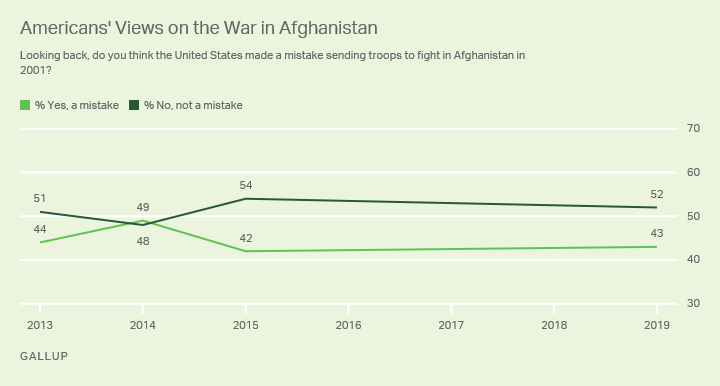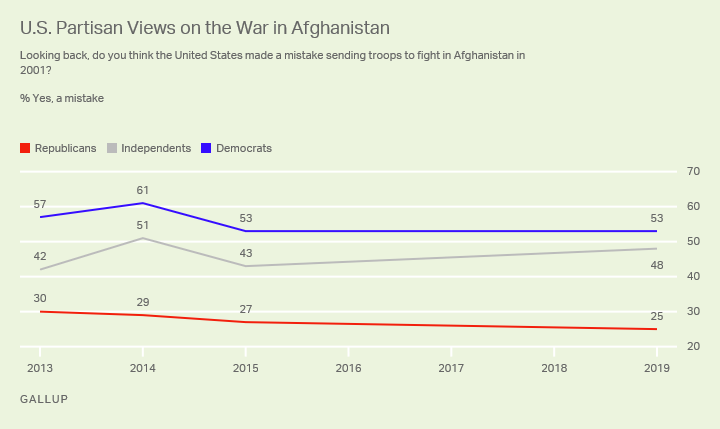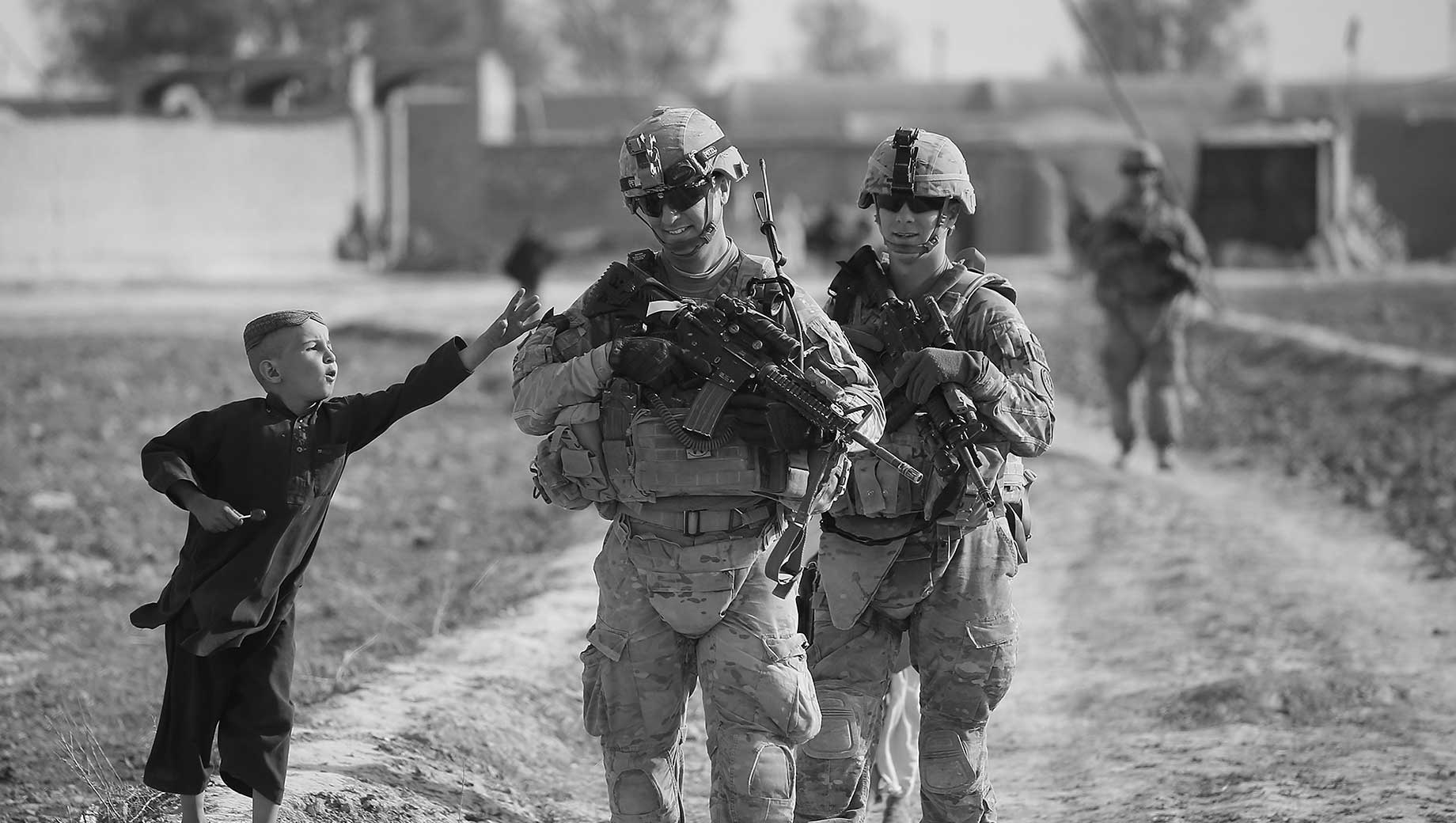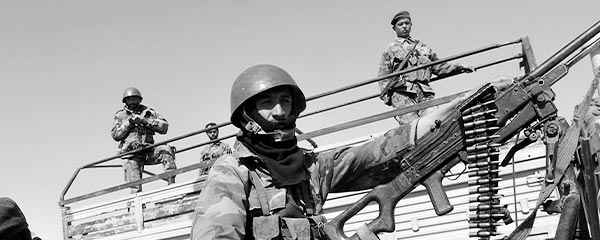Story Highlights
- 43% of Americans say the Afghanistan War was a mistake; 52% disagree
- Americans differ on the war's impact on U.S. safety from terrorism
- Substantial partisan divides on both issues
WASHINGTON, D.C. -- Peace negotiations between the U.S. and Taliban negotiators collapsed this past weekend. The cancellation of the talks leaves the future of the war in Afghanistan in question, as Americans' views of the war effort are holding steady from Gallup's last measure, conducted four years ago, with 43% currently saying it was a mistake to send troops there and 52% saying it was not a mistake.

These data come from Gallup's latest survey, conducted Aug. 15-30, as peace talks took place between U.S. and Taliban negotiators in Qatar. ���۴�ýasked a similar question concerning the wisdom of the war in Afghanistan from November 2001 through May 2011 and found majority support for the war throughout the period. In November 2001, shortly after the U.S. sent troops to Afghanistan, 9% of Americans said the war was a mistake, while 89% believed it was not. By July 2004, the percentage expressing opposition to the war had increased to 25%; it reached 43% in August 2010. Since then, opinions have largely stabilized, including 39% of Americans saying the war was a mistake and 58% saying it was not shortly after the death of Osama bin Laden in May 2011.
In all but one post-2011 reading, the slight majority of Americans have continued to say the war was not a mistake, as they do today, while just over four in 10 have said it was a mistake. The lone exception came in 2014, after then-President Barack Obama announced a plan for the withdrawal of most U.S. forces.
Partisan Divide on the Wisdom of the War
While a slight majority of Americans overall do not see the war in Afghanistan as a mistake, there are substantial partisan differences on the question. Currently, there is a 28-percentage-point gap between Democrats and Republicans who view the war as a mistake. This has been a consistent pattern since 2013, a period that covers the Obama and Donald Trump administrations. Throughout this time, Democrats have been about twice as likely as Republicans to say the war started by Republican President George W. Bush in 2001 after the 9/11 attacks was a mistake.

Among political independents, views that the war was a mistake have fluctuated from a low of 42% in 2013 to a high of 51% in 2014.
Americans Also Split on the Impact of War on U.S. Safety
The latest survey also asked Americans, for the first time, what effect they believe the Afghanistan War has had on U.S. safety from terrorism. The verdict is mixed, with 43% saying the war has made the U.S. safer, 46% saying it has made the country less safe and 7% volunteering that it has made no change.
| Safer | Less safe | No change (vol.) | |||||||||||||||||||||||||||||||||||||||||||||||||||||||||||||||||||||||||||||||||||||||||||||||||
|---|---|---|---|---|---|---|---|---|---|---|---|---|---|---|---|---|---|---|---|---|---|---|---|---|---|---|---|---|---|---|---|---|---|---|---|---|---|---|---|---|---|---|---|---|---|---|---|---|---|---|---|---|---|---|---|---|---|---|---|---|---|---|---|---|---|---|---|---|---|---|---|---|---|---|---|---|---|---|---|---|---|---|---|---|---|---|---|---|---|---|---|---|---|---|---|---|---|---|---|
| % | % | % | |||||||||||||||||||||||||||||||||||||||||||||||||||||||||||||||||||||||||||||||||||||||||||||||||
| All Americans | 43 | 46 | 7 | ||||||||||||||||||||||||||||||||||||||||||||||||||||||||||||||||||||||||||||||||||||||||||||||||
| Republican | 66 | 25 | 5 | ||||||||||||||||||||||||||||||||||||||||||||||||||||||||||||||||||||||||||||||||||||||||||||||||
| Independent | 35 | 51 | 9 | ||||||||||||||||||||||||||||||||||||||||||||||||||||||||||||||||||||||||||||||||||||||||||||||||
| Democrat | 33 | 58 | 7 | ||||||||||||||||||||||||||||||||||||||||||||||||||||||||||||||||||||||||||||||||||||||||||||||||
| (vol.) = volunteered response | |||||||||||||||||||||||||||||||||||||||||||||||||||||||||||||||||||||||||||||||||||||||||||||||||||
| Gallup, Aug. 15-30, 2019 | |||||||||||||||||||||||||||||||||||||||||||||||||||||||||||||||||||||||||||||||||||||||||||||||||||
Much like the partisan divide on the war's wisdom, there are substantial partisan differences over the perceived impact of the war on U.S. security. Republicans are twice as likely as Democrats to say the war has made the U.S. safer from terrorism, 66% vs. 33%. Independents' views are much like those of Democrats, with 35% saying the war has made the U.S. safer.
Bottom Line
During his campaign for the presidency, Trump was critical of the war in Afghanistan and promised to end the conflict. Despite this pledge, Trump committed to sending more troops to the country in 2017. However, from that point until Trump's cancellation of the negotiations, his administration had strongly pushed for a peace treaty with the Taliban to bring an end to U.S. involvement in the conflict. Concurrent with these talks, Taliban forces have continued their attacks throughout Afghanistan, and the government of the country has essentially been excluded from the negotiations.
Americans' views of the war in Afghanistan appear to have stabilized, remaining more positive than negative on balance. Should Trump or a future Democratic president move to fully end U.S. involvement in Afghanistan, this is unlikely to change.
View complete question responses and trends.
Learn more about how the works.




